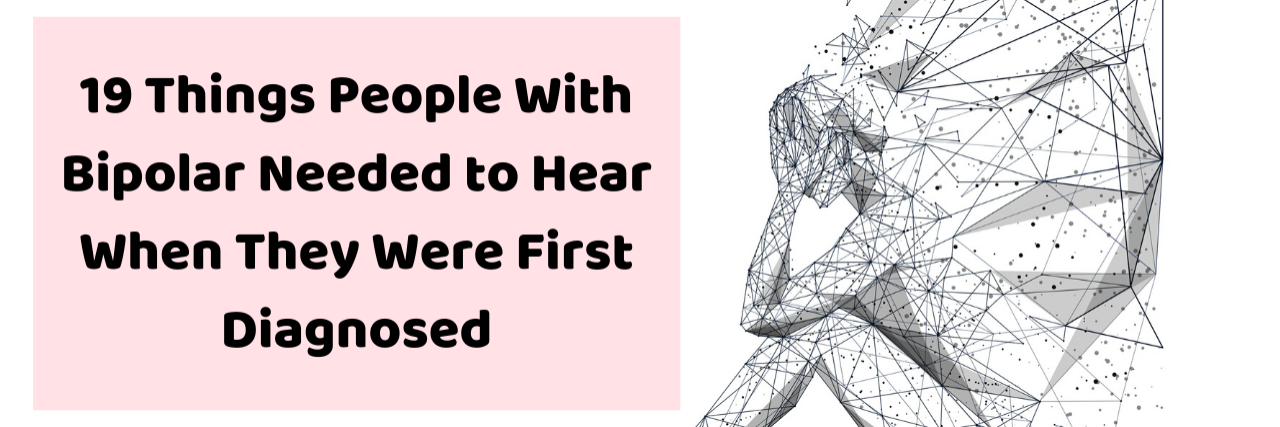When receiving a medical diagnosis, a doctor often explains the basic symptoms and treatment options for the condition. Receiving a diagnosis, however, often changes people’s lives in more ways than just managing the symptoms they are experiencing.
• What is Bipolar disorder?
Bipolar disorder is often stigmatized, and people receiving a bipolar diagnosis may be looking for more reassurance because of it. For years, their loved ones and co-workers may have called them “crazy.” They may have read misconceptions about bipolar that make a diagnosis feel scary and shameful.
The Mighty wanted to know more about being diagnosed with bipolar and things people wished they heard when they were first diagnosed. That’s why we reached out to the bipolar community on The Mighty to hear about their experience.
Here’s what the community had to say:
- “I needed people to let me experience negative emotions without asking if I remembered to take my meds. It took a long time to begin to show certain people anger or sadness after that because they were always questioning my mental state. What I really needed was for someone to tell me that it’s OK to be upset, angry, worried, etc. even after you find meds that work for you. You’re still human.” — Kortnee D
- “This isn’t going to be easy, but there are ways to be happy and healthy. And if you can’t do it alone always reach out to a professional.” — Morgan E
- “You may have ups and downs, but you’re still a human being who’s capable of things even though it might feel like you can’t at times. Don’t let people’s judgments about your disorder get in the way of living a fulfilling life. Bipolar is just as real as any physical disorder.” — Kristen H
- “It’s manageable, and you will be OK. It’s not your fault, you are not broken.” — Sammy E
- “[Having bipolar] wasn’t the end of my story, it’s the beginning of something I’ll be proud to tell my kids one day.” — Kari Y
- “I needed people to realize I’m not fragile and I can handle the truth no matter how hard it was to hear.” — Melissa U
- “What you are experiencing, sensing, thinking and feeling emotionally are all valid and real.” — Britt B
- “I needed to hear that I am not and never will be less than because of my diagnosis. That this illness will affect the way I react to things, but will not change the core of who I am.” — Shan M
- “I needed to hear words like no matter what, we will be here for you and go through this together. We will be here, not make you feel invisible nor try to downplay your diagnosis. We are here for you. We know there will be ups and downs. We are here.” — Yakabu J
- “It’s OK if it takes a while to stabilize. Recovery isn’t linear [and] you’ll have good and bad days but having a care/crisis plan gives you the power to manage it.” — Nicole M
- “[I needed to hear] that I’m still loved. That I’m not crazy. That I’m supported more than ever.” — Sarah B
- “I needed a medical professional to simply give me the diagnosis of being bipolar. Understanding my diagnosis took the fear away from it.” — Kara S
- “Just because I was diagnosed doesn’t mean I am a lost cause.” — Taylor D
- “[I needed to hear] that it is OK to take medications if it mean[s] taking care of yourself and your mental health.” — Ashleigh B
- “Just because you’re having a good day doesn’t mean you’re having a manic episode.” — Ashley H
- “Fight for the best psychiatric care you can get, you deserve it! It’s going to be hard — let yourself feel that — but also let yourself feel your victories, no matter how small (i.e. I got dressed on a low day!). You can still be brilliant and amazing, and the medications (which will change over the years!) will show you a new ‘normal’ you never thought possible.” — Sarah S
- “[I wish I was told] that bipolar is complex, has many signs and symptoms and is not just about mood swings.” — Lillibet B
- “You can have a healthy relationship with this diagnosis. It will be challenging at times, but your life will still be full of love. You can pursue your ambitions if you look after yourself. Ultimately, bipolar does not define you. You, define you.” — Stephanie A
- “You have gotten through every moment in your life up until this point and you know that because you’re still here. Remember that” — Isaac O
Editor’s note: Some responses have been shortened and edited for clarity.
If you’d like to learn more about bipolar disorder and find resources, visit the International Bipolar Foundation.

